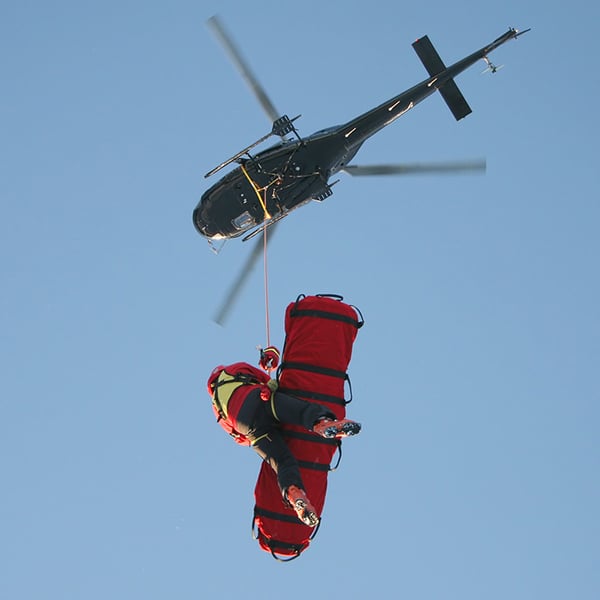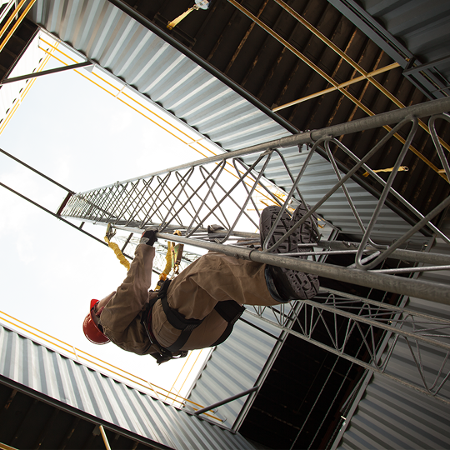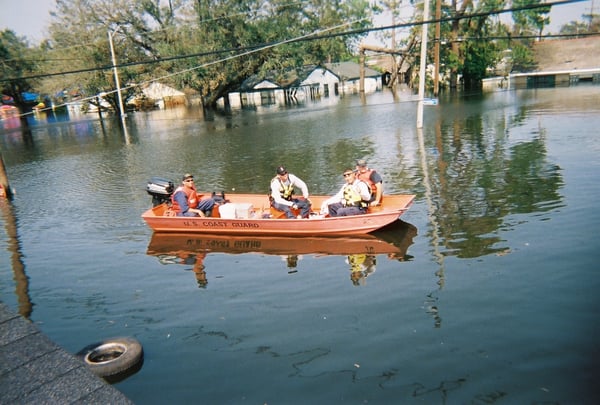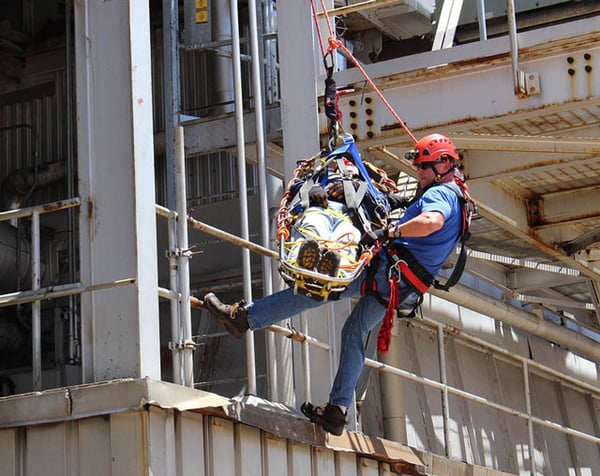Is Technical Rescue For You?
Altruistic, team player, social, hard worker, strong of spirit, caring for others, adrenaline junkie, somewhat athletic, closet superhero… If these are traits you possess, then you should consider training to become a technical rescue specialist.
Certain professions and certain industries have very clear needs for specific technical rescue skills. If you are a firefighter, technical rescue skills will make you a better firefighter, and may also help advance your career. Industrial facilities often have their own in-house rescue team, assembled to meet the particular rescue scenarios that are more likely to arise at that facility. These teams are usually made up of “regular employees” who have day jobs as operators, etc., but who receive extra training (and extra pay) to be on the rescue team.
If you’re not in a profession or an industry where there is a need, you can still become part of a local rescue group for your town or county, in which case you’ll want to train in the specialty disciplines most needed for your community. No matter where you develop your technical rescue skills, if you’re cool under pressure and your skills are solid, you will be in demand.
An Energetic and Enthusiastic Community
Rescuers are passionate and enthusiastic about rescue work. Another way of saying it is: nobody is “meh” about rescue. Every single rescuer I’ve ever talked to lights up with a certain energy when they talk about their particular skills and experiences. It doesn’t matter if they are part of a local mountain rescue group, a member of an industrial confined space rescue team, or work on towers with an ability to rescue their co-workers… when the conversation turns to rescue, their energy kicks up a notch.
The energy comes from a sense of pride and fulfillment. Seldom is it boastful or insincere. Most every rescuer is in it for the right reasons, and that is to do what you can, use your training and work as a team to help someone who has gotten into trouble and needs rescue.
The Ups and Downs of the Job
Having taken part in many dozens of rescues, I can attest to the feeling of contribution that comes from knowing that someone will live to enjoy the rest of their days due in large part to my actions as a rescuer. It’s a good feeling.
However, if you’re considering technical rescue, it’s important to know that not all rescue operations have good outcomes. Technical rescue situations can turn into recovery operations before you even have a chance to do anything. And sometimes bad outcomes occur despite a rescuer’s or a rescue team’s best efforts. This is one of the realities that you must consider, but knowing that you did your best and remembering that without your efforts, that individual would have had no chance whatsoever, will help you refocus on the reason you must keep trying.
Technical Rescue is a Broad Field with Many Disciplines
So, what rescue disciplines are we talking about? When most people hear “rescue” they tend to think ambulance crew, or maybe high angle rope rescue. However, there are many more disciplines that may have a need for rescue team members in your local area or your place of work. Here is a list of rescue disciplines taken out of the National Fire Protection Association (NFPA) 1006 standard for technical rescue personnel professional qualifications:
- Tower Rescue
- Rope Rescue
- Structural Collapse Rescue
- Confined Space Rescue
- Vehicle Rescue
- Animal Technical Rescue
- Wilderness Search and Rescue
- Trench Rescue
- Machinery Rescue
- Cave Rescue
- Mine and Tunnel Rescue
- Helicopter Rescue
- Surface Water Rescue
- Swiftwater Rescue
- Dive Rescue
- Ice Rescue
- Surf Rescue
- Watercraft Rescue
- Floodwater Rescue
As you can see, there are many more rescue disciplines than the few that most people are aware of. If you see a specialty discipline from this list that you feel is something that you would be good at or that is in demand where you work, whether that’s industrial or municipal, I encourage you to get involved.
Or, if there is a need in your local community, then you might contact your local search and rescue (SAR) team. This can be a great way to gain experience and build your skills. You may also want to research possibilities with your state’s FEMA or USAR team, which typically require advanced training and experience, but is good information to have if you’re setting your sights on eventually joining.
Common Characteristics of Technical Rescuers
Let’s look at some of the personality traits that I mentioned earlier and why they may indicate you are cut out for rescue.
- Altruism: Having a selfless concern for the well-being of others is a very strong motivator for most all rescuers.
- Team player: Taking pride in contributing to the team’s success and ultimately a successful rescue as a team, provides a shared gratification that seems to multiply within the dynamics of the team.
- Social: Most of my best lifelong friends are rescuers. We tend to be a pretty happy and social bunch.
- Hard Worker: Rescue requires effort. It is not a push button, blink your eyes and it is done sort of deal. It will require some study, at times uncomfortable physical effort, and the need to contribute as a support member.
- Strong of Spirit: You will at times have to make decisions and accept responsibility for the outcome of those decisions. If you approach your training and operational responses with honesty and integrity, doing the best you can, that should give you pride in knowing that your promise to do your best is relied on by your team and your rescue subjects.
- Adrenaline Junkie: OK, the reality is, most of the preparation, training for, and actual performance of technical rescue is not all that exciting. But there are plenty of moments that do provide a good deal of adrenaline producing moments.
- Somewhat Athletic: Not all rescue activities are dynamic in terms of physicality, but most require some degree of fitness, agility, strength, and balance.
- Closet Superhero: We like to keep this particular trait hush hush. I have dealt with some rescuers who did prance around as if they were wearing a mask and a cape, but for the most part we are a group of quiet professionals that internalize that feeling of being a superhero. But hey, I admit it, when things went really well on a rescue, at times I felt like Superman.
Answer the Call
We’ve just entered a new decade, which makes us take note of the passage of time and how we’re using ours. You’ve read this far because you’re curious about technical rescue work and wondering if it’s for you. Well, if you’re looking for a greater sense of purpose and you want to serve others, and if you want to be part of a dynamic and enthusiastic community, follow your gut instinct and go for it! You won’t regret it.




